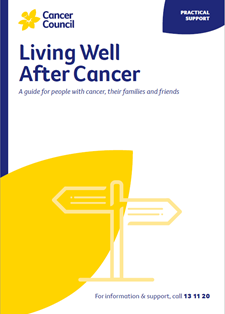- Home
- Cancer Information
- Living well
- Living well after cancer
- Follow-up care
- Preparing for appointments
Preparing for appointments
Ask questions
It may help to write down any questions you have and take this list with you to your appointments (see this list of suggested questions). If your doctor uses medical terms you don’t understand, ask them to explain them in plain English. If you have several questions, ask for a longer appointment when booking.
Record the details
Taking notes can help you remember what was discussed. If you would like to record the discussion, ask your doctor first. It is a good idea to have a family member or friend go with you to appointments for emotional support or to take part in the discussion. You may wish to ask them to make notes or simply listen.
Report on health issues
Tell your doctor or nurse if you have:
- difficulty doing everyday activities
- any new symptoms or new aches or pains that seem unrelated to an injury, or existing aches or pains that have become worse
- changes in weight or appetite
- feelings of anxiety or depression
- other health problems, such as heart disease, diabetes or arthritis
- started taking any new medicines or using complementary or alternative treatments.
Discuss other issues
You may want to talk to your health care team about other issues, such as changes to your sex life, how cancer has affected your relationships, returning to work or financial difficulties.
Treatment history
Give each health professional you see a copy of your survivorship care plan or treatment summary. If you don’t have one of these, tell them about your cancer diagnosis, treatment and any ongoing side effects, as this may affect the treatment they give you.
More resources
Prof Michael Jefford, Medical Oncologist and Director, Australian Cancer Survivorship Centre, Peter MacCallum Cancer Centre, VIC; Lucy Bailey, Nurse Counsellor, Cancer Council Queensland; Philip Bullas, Consumer; Dr Kate Gunn, Clinical Psychologist and Senior Research Fellow, Department of Rural Health, University of South Australia, SA; Rosemerry Hodgkin, 13 11 20 Consultant, Cancer Council WA; Prof David Joske, Clinical Haematologist, Sir Charles Gairdner Hospital and Clinical Professor of Medicine, The University of Western Australia, WA; Kim Kerin-Ayres, Clinical Nurse Consultant, Cancer Survivorship, Concord Hospital, NSW; Sally Littlewood, Physiotherapist, Seymour Health, VIC; Georgina Lohse, Social Worker, GV Health,VIC; Melanie Moore, Exercise Physiologist and Clinical Supervisor, University of Canberra Cancer Wellness Clinic, ACT; June Savva, Senior Clinician Dietitian, Nutrition and Dietetics, Monash Cancer Centre, Monash Health, VIC; Dr Elysia Thornton-Benko, Specialist General Practitioner and Research Fellow, University of New South Wales, NSW; Prof Janette Vardy, Medical Oncologist, Concord Cancer Centre and Professor of Cancer Medicine, The University of Sydney, NSW; Lyndell Wills, Consumer.
View the Cancer Council NSW editorial policy.
View all publications or call 13 11 20 for free printed copies.
Need to talk?
Support services
Life after cancer treatment
Programs and support for people who have finished treatment
Cancer Council Online Community
A community forum – a safe place to share stories, get tips and connect with people who understand
Cancer information
Emotions and cancer
Learn about the different emotions you may experience after a cancer diagnosis
Staying healthy after treatment
Lifestyle changes that can help keep you in good health

